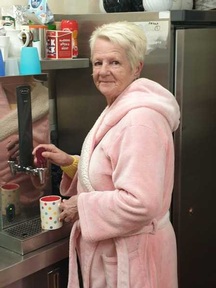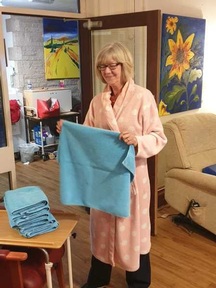Care home staff wear pyjamas so dementia residents know it's bedtime
Care workers at a care home in Cumbria wear pyjamas and dressing gowns at night to remind residents with dementia, who get disorientated, that it is bedtime.

The care home, which is in the village of Allithwaite and is family-owned, has a non-uniform policy as it believes residents will feel more at home if staff wear their own clothes.
Charlotte Gregson, home manager at The Old Vicarage, who is responsible for the bedtime initiative, said: “None of our care staff, including myself, wear uniforms. We feel that uniforms separate us, they are a symbol of power and control, and represent ‘doing a job’, whereas we want our residents to feel special, loved, and at home.
“Many of our residents are living with dementia and when they wake during the night it can be confusing to see lots of activity. By going about their work in pyjamas and dressing gowns, our night staff are helping to remind residents that it’s time for bed.”
Reviews left on the leading care home reviews site, carehome.co.uk, show the Old Vicarage care home treats their residents with compassion and dignity.
One relative said: "My father lived here for nearly two years prior to his recent passing. The moment he first entered he (and his family) were made to feel very welcome. The care and devotion to the residents is exceptional. The place is at all times spotlessly clean. We have been absolutely delighted by the care all (night and day) staff gave my father and cannot praise this home loudly enough.”
Another said: "Myself and my family have been consistently impressed with every aspect of care at The Old Vicarage. I have had experience of many care homes over the years and nowhere else have I experienced this level of exceptional personal care. The Old Vicarage has a warm, upbeat family feel. The staff are thoughtful, considerate and always have time to talk. I cannot recommend The Old Vicarage highly enough.”
The care home recently posted a photo of their staff wearing pyjamas and dressing gowns on their Facebook page.
The Facebook post, which showed care assistants Janet Cartwright and Brenda Kerr carrying out their care duties, received over 400,000 likes, was shared almost 240,000 times and received 50,000 comments.
Care home manager, Ms Gregson, said “We never dreamt the post would be so popular.
“It’s an idea that seems to have captured everyone’s hearts. We’ve had thousands of comments and messages from people who think it’s an amazing idea and praising us for our person-centred care.

“Many of the comments are from people whose loved ones are living with dementia, saying how confused they get at night, and that this simple idea can make such a huge difference.
“Other comments are from care workers who want to adopt the idea in their place of work. It would be marvellous to think that a post about our pyjama-wearing team might actually spark a change in how care homes across the UK support their dementia residents.”
Last year, Simonsfield Care Home in Runcorn, Cheshire, trialled wearing pyjama-style scrubs at night-time and found it reduced sleep deprivation, as well as pacing and disorientation for residents living with dementia.
Care home manager, Debbie Smith came up with the idea of cartoon patterned scrubs for night staff.
She said: “We thought we’d try out scrubs that mimic pyjamas for the night carers to help minimise sleep deprivation, pacing and disorientation for our residents living with dementia.
“The initiative met with a really good response from most of the residents and we’ve seen a drastic improvement in their sleep patterns, so the switch has been made permanent.” She added: “It is remarkable how a simple change in uniform can have such drastic impact on the lives of those living with dementia.”
Disorientation and pacing was a regular occurrence during night time hours at the care home, leading to sleep deprivation and associated lack of energy, irritability and mood swings.
Latest News
 29-Jul-24
Dementia Bus gives carehome.co.uk staff insight into life with dementia
29-Jul-24
Dementia Bus gives carehome.co.uk staff insight into life with dementia
 01-Mar-24
Find out the top care homes in 2024
01-Mar-24
Find out the top care homes in 2024
 21-Mar-23
UK's top care homes in 2023 revealed
21-Mar-23
UK's top care homes in 2023 revealed
 03-Jan-23
carehome.co.uk launches free care helpline
03-Jan-23
carehome.co.uk launches free care helpline
 13-Dec-22
5 mins with Emily Whitehurst, chief operating officer for Constantia Healthcare
13-Dec-22
5 mins with Emily Whitehurst, chief operating officer for Constantia Healthcare